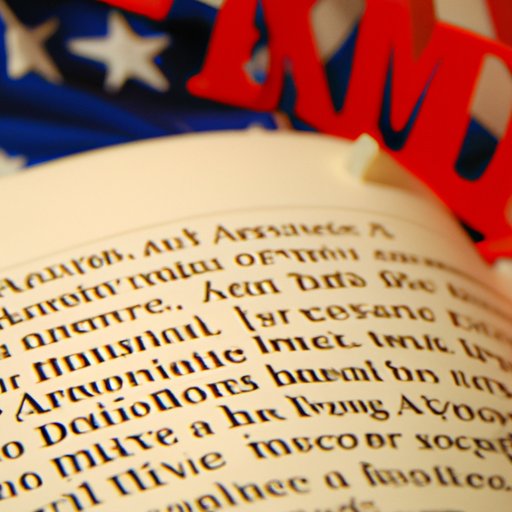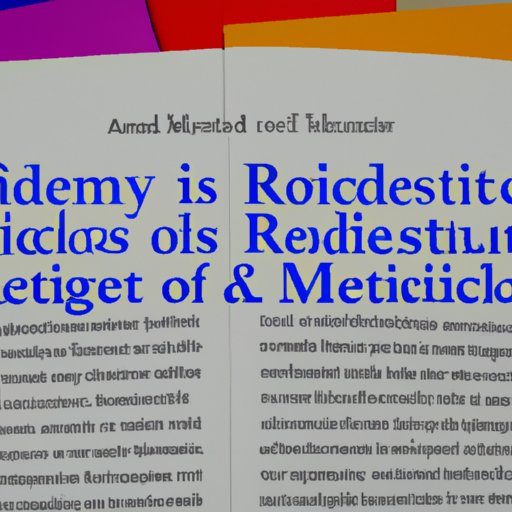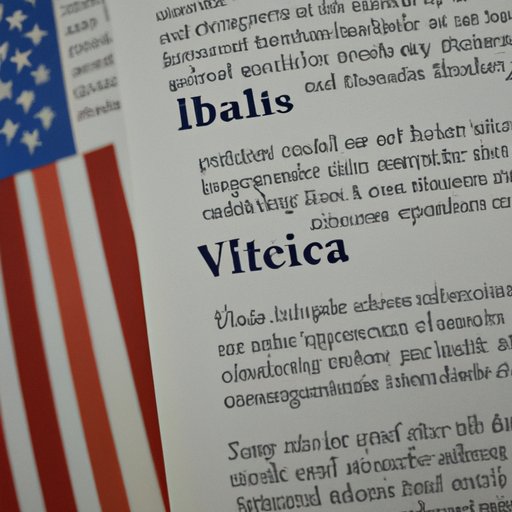Introduction
American identity in literature is a complex concept, reflecting the intricacies of the nation’s history, culture, and people. While there is no singular definition of what it means to be American, literature offers an invaluable insight into the multifaceted nature of American identity. In this article, we will explore various topics related to American identity in literature, such as the American Dream, race and gender roles, regionalism and nationalism, and the representation of American values and culture.

Exploring the American Dream in Literature
The American Dream is a central theme in much of American literature. It is defined as “the belief that through hard work, courage, and determination, one can achieve success and prosperity.” This idea of the “self-made man” has been a recurring motif in works by authors such as F. Scott Fitzgerald, Ernest Hemingway, and John Steinbeck. For example, in The Great Gatsby, Jay Gatsby embodies the ideals of the American Dream as he strives to attain wealth and status in pursuit of his dream of winning back the love of Daisy Buchanan.
The American Dream plays an important role in shaping American identity in literature. It serves as a reminder that anyone, regardless of their background or circumstances, can achieve success and prosperity through hard work and determination. It also emphasizes the importance of individualism and self-reliance, as well as the power of ambition and perseverance. These themes are often explored in literature, and serve to illustrate the many facets of American identity.

Examining the Role of Race and Gender in American Identity in Literature
Race and gender play a significant role in American identity in literature. Historically, literature has often perpetuated racial and gender stereotypes, depicting people of color and women in a negative light. These stereotypes have played a major role in shaping the way American identity is perceived and portrayed in literature. For example, in Harper Lee’s To Kill a Mockingbird, the character of Tom Robinson is depicted as a victim of racial injustice, highlighting the racism and discrimination faced by African Americans in the South during the 1930s.
Racial and gender stereotypes have also impacted the way American identity is viewed in literature. Women and people of color are often portrayed as second-class citizens, with limited opportunities for success and advancement. This reinforces the idea that certain groups are not worthy of the same rights and privileges afforded to white men. However, contemporary authors are beginning to challenge these stereotypes, presenting more nuanced and realistic depictions of race and gender in American literature.
A Study of Regionalism and Nationalism in American Literature
Regionalism and nationalism are two concepts that are often explored in American literature. Regionalism refers to a sense of pride and loyalty to a particular region or locality, while nationalism is a belief in the superiority of one’s own nation. Both of these concepts play a major role in shaping American identity in literature. Authors often depict characters who are fiercely loyal to their home state or region, or who are proud of their nation and its values.
Examples of regionalism and nationalism in literature can be seen in works such as Mark Twain’s Adventures of Huckleberry Finn and William Faulkner’s As I Lay Dying. In both novels, the protagonists demonstrate a strong sense of loyalty to their home states of Missouri and Mississippi, respectively. Similarly, Walt Whitman’s Leaves of Grass celebrates the beauty and grandeur of the American landscape, illustrating the poet’s deep love for his country.
By exploring regionalism and nationalism in literature, authors are able to provide insights into the many different facets of American identity. Through these works, readers gain a better understanding of the diverse cultures, beliefs, and values that make up the United States.

Analyzing the Depiction of American Values Through Fiction
American values are another important aspect of American identity in literature. These values include a commitment to freedom and equality, as well as a respect for the rule of law. Examples of these values can be seen in works by authors such as Arthur Miller, John Steinbeck, and Harper Lee. In Death of a Salesman, Miller reflects on the idea of the “American Dream,” while Steinbeck’s The Grapes of Wrath examines the plight of migrant workers in California during the Great Depression.
The depiction of American values in literature serves to illustrate the ideals that define the nation. By exploring these values, authors are able to provide insights into the core beliefs and principles that make up the American identity. Through fiction, readers gain a better understanding of the fundamental values that shape the nation.
Investigating How Immigration Shapes American Identity in Literature
Immigration is another important factor in American identity in literature. Immigration has long been a part of the American experience, and literature has often sought to explore the impact it has had on the nation. For example, in The House on Mango Street, Sandra Cisneros tells the story of a young Latina girl growing up in a Mexican-American neighborhood in Chicago. The novel highlights the struggles immigrants face in adapting to life in the United States, as well as the challenges they must overcome to find a place in their new home.
By exploring the experiences of immigrants in literature, authors are able to provide insights into the role immigration has played in shaping American identity. Through these stories, readers gain a better understanding of the diversity and complexity of the American experience, and the ways in which immigration has contributed to the nation’s cultural and social fabric.

An Overview of the Evolution of American Identity in Literary Works
American identity in literature has evolved over time. In the early years of the nation’s history, authors such as Nathaniel Hawthorne and Herman Melville explored themes of Puritanism and religious devotion. Later, writers such as Ernest Hemingway and F. Scott Fitzgerald focused on the idea of the “self-made man” and the pursuit of the American Dream. In the 20th century, authors such as Toni Morrison and Alice Walker began to explore the complexities of race, gender, and class in America.
Today, contemporary authors are pushing the boundaries of American identity in literature. Authors such as Junot Díaz and Chimamanda Ngozi Adichie are exploring the experiences of immigrants, people of color, and other marginalized groups. They are challenging traditional notions of American identity, and offering new perspectives on the nation’s history, culture, and values.
Investigating the Representation of American Culture in Contemporary Novels
American culture is another important aspect of American identity in literature. Contemporary authors are exploring the changing nature of American culture, examining the ways in which it is shaped by globalization and technology. For example, in Jonathan Franzen’s Freedom, the characters grapple with the effects of modernity on their lives. The novel examines how technology has changed the way people interact with one another, and how this has impacted the way they view themselves and the world around them.
By exploring the representation of American culture in literature, authors are able to provide valuable insights into the nation’s history, values, and beliefs. Through these works, readers gain a better understanding of the many different aspects of American identity, and how they have evolved over time.
Conclusion
American identity in literature is a complex and multifaceted concept, reflecting the diversity and complexity of the nation’s history, culture, and people. From the American Dream to regionalism and gender roles, literature provides an invaluable insight into the many different aspects of American identity. By exploring these topics, authors are able to offer a unique perspective on the nation’s values, beliefs, and culture. As American identity continues to evolve, literature will continue to play an important role in helping us understand and appreciate the nation’s past, present, and future.
(Note: Is this article not meeting your expectations? Do you have knowledge or insights to share? Unlock new opportunities and expand your reach by joining our authors team. Click Registration to join us and share your expertise with our readers.)
